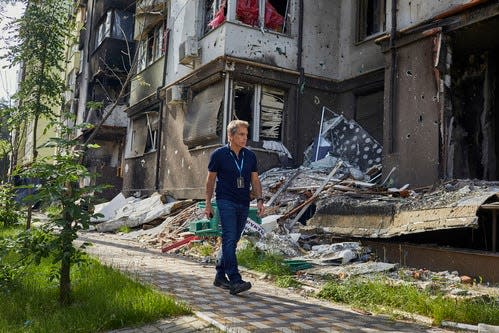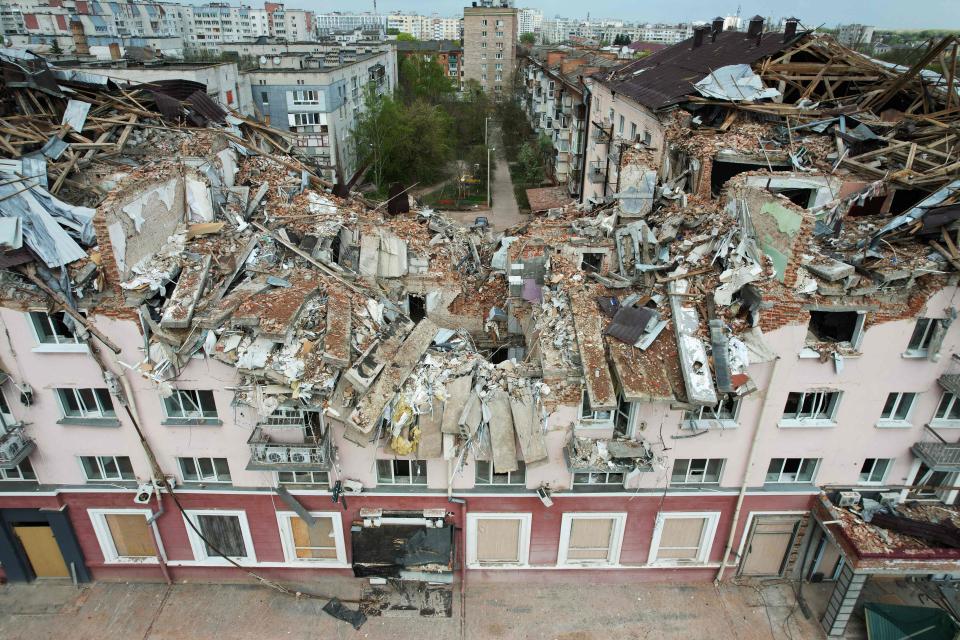Ukrainian refugees to enter US surpasses 150,000. Long-term survival is a big concern. Here's why.
Roughly 150,000 Ukrainians have entered the U.S. since March, and many new arrivals are relying on their new communities to survive as they struggle to overcome the trauma of war.
“Like all refugees, they’re starting from scratch,” said Krish O’Mara Vignarajah, President and CEO of Lutheran Immigrant and Refugee Service, based in Baltimore. “They’ve lost their homes, left loved ones behind, seen the images of civilians executed. All of that takes a tremendous mental toll.”
President Joe Biden vowed in late March that the U.S. would accept up to 100,000 Ukrainian refugees, in addition to pledging $1 billion in humanitarian aid to those affected by the war. While that goal has now been surpassed, according to the U.S. Department of Homeland Security data, the number is still but a fraction of the estimated 6.3 million Ukrainians displaced by the Russian invasion.
Furthermore, the future remains in doubt for many, with more than half of the refugees admitted on a temporary basis that means they'll eventually have to return home, whether or not there is a home to go back to.
“It’s important that the U.S. continue to serve as a safe haven,” Vignarajah said. “But it’s a drop in the bucket compared to the massive displacement we’ve seen.”
She said that of the more than 6 million Ukrainians who have been forced to flee their homeland, she said, 1.3 million have found refuge in Poland, with about 1 million in Germany and 413,000 in the Czech Republic.
As time goes by, the biggest unknown for many may be their legal status, since many have been allowed to come to the U.S. only temporarily.
“That’s a big open question that weighs heavily on anyone who’s come from Ukraine,” said AnnaMarie Bena, vice president of the U.S. Committee for Refugees and Immigrants, a refugee resettlement agency based in Arlington, Virginia.
About half of those who have entered the U.S have arrived through Uniting for Ukraine, an ad hoc program launched in April as an emergency response to the crisis. The program allows individuals in the U.S. to sponsor Ukrainian refugees or their immediate family members to enter via a “humanitarian parole” status similar to that employed for Afghan refugees evacuated to the U.S. last year.
Entering through the program gives refugees quicker entry to the U.S. compared to the U.S. Refugee Admissions Program, a slow-moving process that can take up to a year -- but comes without the same social services or pathway to legal residency that the traditional program offers.
As of Aug. 19, according to DHS, U.S. Citizenship and Immigration Services has received more than 109,000 requests from individuals seeking to support Ukrainian refugees as part of the Uniting for Ukraine program.
More than 38,000 program refugees have been processed, the department said. A similar number have been approved but have yet to arrive; under the program, refugees are responsible to booking their own travel.

Meanwhile, more than 79,000 Ukrainians have been processed since March 24 through other programs, the department said, including temporary visas and the mainstay U.S. Refugee Admissions program. About 20,000 Ukrainian refugees entered through the U.S.-Mexico border earlier this year, but that avenue has since largely been closed.
While no definitive data shows where refugees are resettling, advocates say most refugees are resettling in New York, New Jersey and Pennsylvania, as well as cities such as Chicago, Seattle and Los Angeles. Others are showing up in unexpected places, Vignarajah said.
“Hundreds showed up at one of our affiliate offices in Jacksonville, Florida,” she said.
Seeking basic necessities in new surroundings
Those who arrive have largely been women and children, and the pathway they take to get to the U.S. determines what level of social services they get once they arrive.
Those admitted through the U.S. Refugee Admissions Program, in which individuals are referred by the United Nations, get help with basic necessities like housing, employment and enrollment for children’s schooling and other benefits. Furthermore, such refugees are on firmer legal footing when it comes to legal permanent residence, for which they can apply after a year in the U.S.
“The downside is that it is slow, but the upside is that it comes with wraparound services,” said J.C. Hendrickson, senior director of resettlement, asylum and integration policy and advocacy for International Rescue Committee, a refugee resettlement agency based in New York.
And while refugees might not end up in their first apartment or job of choice, “it puts people on a pathway to being self-sustaining,” Hendrickson said. “People fare really well.”
Uniting for Ukraine was created as an emergency measure to sidestep that program’s plodding pace. However, the Uniting for Ukraine program relies on private sponsors – for instance, Ukrainian family members living in the U.S. – not only to vouch for applicants but to be responsible for their financial support once they arrive.
“The hope is that the people sponsoring them are people they can trust to be able to help them so they’re not completely dependent on social services,” said Bena of the U.S. Committee for Refugees and Immigrants. “But there’s not really any repercussions for sponsors if they don’t meet what they say they’ll meet.”
Additionally, such refugees are only eligible to stay for up to two years – without formal social services aid or path to legal residency.
While Uniting for Ukraine program refugees who connect with resettlement agencies can apply for financial assistance through supplemental aid approved by Congress, they may not be aware of those resources. The IRC recently partnered with a workforce solutions company to launch a telephone support line to help address the gap.
“The sponsor might not know and ins and outs of what the refugee needs to do,” Hendrickson said. “That’s what this effort is intended to alleviate. It’s a one-stop shop.”
'What is home going to look like?'
Housing in recent years has been a perpetual and growing challenge for many Americans, and for Ukrainian refugees it will be no different, Bena said. So, too, will employment, given the challenges of a foreign language or professionals whose credentials are meaningless in the U.S.
She compared the situation to that facing Afghan refugees, for whom bills have been introduced in Congress to help solidify their immigration status and create a pathway toward legal residency.
“I’m not aware of anything for this group of Ukrainians yet,” she said. “There seems to be an assumption that Ukrainians will want to return home, but that raises the question: What is home going to look like in two years’ time?”

Vignarajah agreed.
“Some have seen their cities reduced to rubble or annexed by Russia, so they’re not safe,” she said. While a portion of them might be able to apply for asylum, she added, “generalized warfare isn’t grounds for a claim. The U.S. needs to make sure Ukrainians aren’t caught in legal limbo.”
Bena said that while her agency has a network of lawyers working on Afghan refugee cases nationwide, it’s just now starting to hire attorneys to address Ukrainian cases.
“We’re seeing what they might be eligible for,” she said. “It’s really unsettling for people to just not know.”
In the meantime, she said, simply making refugees feel welcome and helping them integrate into their new communities can go a long way.
“They’ve fled war,” she said. “Having that community support is important.”
This article originally appeared on USA TODAY: Ukrainian refugees in US: Long-term survival may be biggest worry

